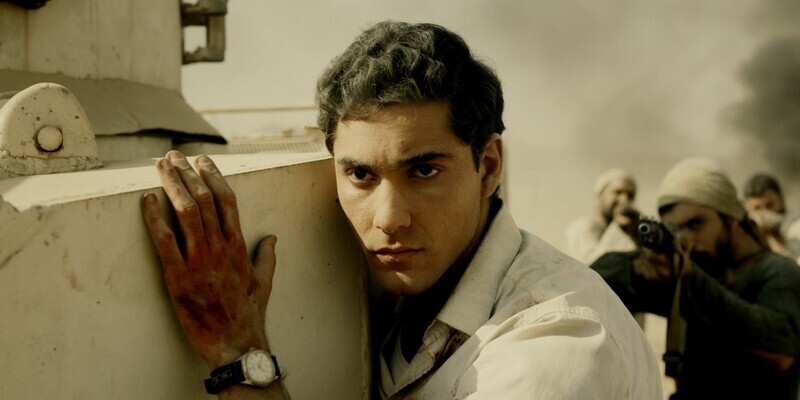
Review by
Benjamin Poole
Directed by: Avi Nesher
Starring: Amir Khoury, Joy Rieger, Ala Dakka, Eliana Tidhar, Tom Avni

Firstly, a historical outline (cribbed from the usual sources):
Founded in 1943, Kibbutz Nitzanim was an Israeli village enclosed by Arab
localities. Under the United Nations Partition Plan for Palestine, the
small area was located inside the enemy state, leaving Kibbutz Nitzanim
completely isolated following December 31st, 1947. Under constant attack
between 1947 to 1948, the Jewish farmers who worked on the kibbutz duly
used old rifles and good old mut to defend the cooperative. Evacuation was
not an option, as Israel's principle aim during the war was the
‘continuation of normal life’ (the possibility was further confounded by
the 360 enclosure of Nitzanim). The encirclement of the kibbutz meant that
Nitzanim’s fall (a grand verb for such a marginal territory) was easily
enacted on June 7th, 1948, when the Egyptian army achieved its first major
victory as the remaining Israelis surrendered to their sustained strike.
Lives lost, their home destroyed, the surviving Israelis were then
denounced by the IDF and the state as cowards. They were farmers.

Approbation from the residents of Nitzanim led to probes into the battle,
and, much later, a subsequent exoneration of the defenders. In a further
balancing of the scales, Avi Nesher’s (director/writer along with
Liraz Brosh and Ehud Bleiberg)
Image of Victory recounts the weeks leading up to the attack
and the eventual (horrific) battle itself. In an intriguingly even-handed
approach, we see events from two perspectives: that of an idealistic film
director, commissioned by the Egyptian army to produce propaganda
(Hassanein - Amir Khoury), and through the plucky denizens of the
kibbutz (with a focus on Mira, played by Joy Rieger in a fantastic
performance). Via these characters the film depicts an inevitable erosion
of youthful optimism into bitterness and gloom. Hassanein is inspired by
Capra to capture ‘real people’ and tell human stories: he ends up filming
the shooting of a young woman by an entire platoon.

For a story with such a grim denouement (which is heralded in the first
scene by an elder Hassanein ranting about the present-day Camp David
Accords), Nesher’s film is, for the most part, alive with joy. The Jewish
workers are a happy go lucky lot, bursting into songs and presenting a
grab bag of recognisable archetypes: the joker, the lovelorn, the serious
poet (although a problem with the film is the shorthand nature of the
characters), while Hassanein’s experience is initially gentle, with the
army coming across at first as fair and reasonable. The kibbutz residents'
amateur pratfalls are mined for comedy, and at one point a raid on a car
is soundtracked by swing music. This cheerful approach, of course, serves
to make the swift and unavoidable violence all the more incongruous.

Amit Yasur’s photography is gorgeous, with lush historical detail
portrayed with a clean and poppy sheen. Image of Victory is
coming to streaming platforms soon, and it’s the sort of film which will
look good still on the smaller screen, with a deeply realised 1940s
milieu. Courtesy of Hassanein, we see events through the different
textures of newsreel footage and are invited to contemplate the nature and
purpose of cinema; the unknowable truth behind stolen images, and perhaps
the artificiality of Image of Victory itself. While Nesher’s
film is at times thrillingly impressive, it perhaps ultimately doesn’t
quite fulfil its ambitions. Nonetheless, with its non-partisan
storytelling and vivid visuals Image of Victory is a Sunday
afternoon epic that doesn’t disappoint.

Image of Victory is on Prime Video
UK now.

